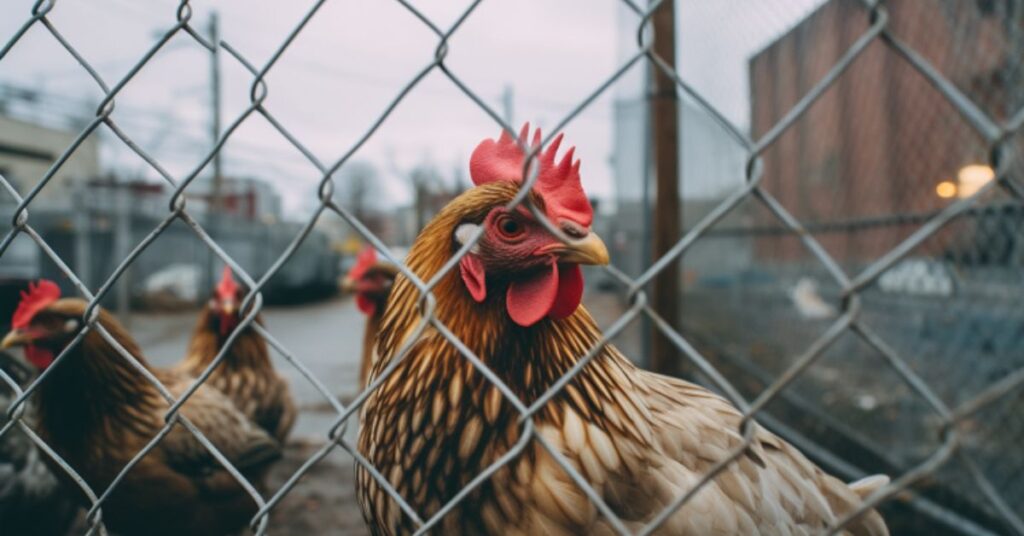Raising backyard chickens comes with many rewards, but it also presents some challenges. One of the biggest concerns for chicken owners is protecting their flock from predators. Hawks are among the most formidable predators that can threaten free-range chickens.
If you’ve wondered whether adding goats can help deter hawks and keep your chickens safe, you’re not alone. In this comprehensive guide, we’ll explore whether goats can actually protect chickens from hawks, and what other measures you can take to safeguard your flock.
The Threat Hawks Pose to Chickens
To understand whether goats can help, it’s important to first examine the threat hawks pose to chickens. Here’s what you need to know:
Hawks Actively Hunt Chickens
Hawks are predatory birds with excellent eyesight and sharp talons. They actively hunt smaller animals for food, and chickens are among their natural prey. Any type of chicken, including full-grown hens and roosters, are vulnerable to hawks.
Hawks Use Speed and Stealth
Hawks rely on the element of surprise when hunting. They spot chickens from high vantage points, then swiftly dive down and snatch their prey before the bird can react. Hawks strike with immense speed and force using their powerful talons.
Hawks are Opportunistic Hunters
Hawks are ambush predators and will capitalize on any situation where chickens are vulnerable. This includes when birds are:
- Free-ranging in open areas
- Unaware while scratching in the dirt or foraging
- Roosting out in the open without cover
Hawks Target Chickens of All Sizes
From small bantams to large jersey giants, all sizes of chickens may fall prey to hawks. The largest hawks can even carry off small turkeys.
Hawk Attacks Can Happen Any Time of Day
While most active in the early morning and late afternoon, hawks will hunt whenever they spot potential prey. Chicken owners must be vigilant about attacks during all daylight hours.
Given the considerable risk hawks pose, chicken keepers need to take proactive measures to protect their flock. Could adding goats help deter hawks and reduce attacks? Let’s take a closer look.
Do Goats Have the Instinct to Protect Chickens From Hawks?
Before bringing goats into your chicken flock, it’s important to understand their natural behaviors and limitations:
Goats Prioritize Self-Preservation
Goats are prey animals themselves, and their self-preservation instincts are strong. If faced with a dangerous predator, their natural reaction is to flee to protect themselves rather than confront the threat.
Goats Have No Innate Protection Instinct Toward Chickens
Goats do not have the same guardian instincts as some other livestock, like donkeys and llamas. They have no natural urge to protect your chickens from hawks or other predators.
Goats Can be More Allure For Predators
In some cases, adding an additional prey animal like goats can attract more predators to your property. Hawks may see your land as a prime hunting ground with multiple types of prey available.
Goats Can be Equally Vulnerable to Predators
Many of the same predators that threaten chickens, including foxes, coyotes, bobcats, and hawks, also prey on young goats and kids. Goats require their own protection strategies.
So while goats won’t purposefully defend chickens from hawks, their presence can still be beneficial in some ways.
How Goats Can Deter Hawks
Though they won’t actively intervene against a hawk attack, goats can provide a level of deterrence:
Goats Present Another Prey Target
Simply having additional prey animals may make hawks less likely to focus solely on your chickens. The presence of goats spreads out the risk across multiple potential targets.
Goats’ Size is Intimidating
Large goats and sheep breeds can appear imposing to hawks scanning for prey from the skies above. Their larger size and unfamiliar shape could deter hawks from swooping in compared to smaller chicken targets.
Goats Create Commotion Hawks Avoid
Goats are noisy and active, often sparring and playing together. This level of activity and chaos can drive away more timid hawks not wanting to navigate it to reach chickens.
More Eyes Watching for Threats
With goats added to your livestock, you have additional eyes watching for any incoming aerial predators. Goats may spot hawks first and signal warnings to chickens.
So while goats should never be relied upon as true protectors, their presence can still be a useful part of your flock protection strategy.
4 Goat Breeds Best Suited to Help Deter Hawks
Not all goats are equal when it comes to having the size and temperament to intimidate predators. Some specific breeds are better choices:
1. Nubian Goats
Originally bred in England as sturdy working goats. Nubians are large, weighing up to 175 pounds. Does can reach 30 inches tall. Their intimidating horns curve outwards up to 12 inches.
2. Boer Goats
A breed developed in South Africa, Boers are heavy-muscled with a short coat. Does weigh up to 150 pounds. Their high-pitched bleating could deter timid hawks.
3. Alpine Goats
Alpine goats are intelligent and energetic. Their upright ears give them excellent alertness. Does are at least 30 inches tall and weigh around 145 pounds.
4. Saanen Goats
A dairy breed originating from Switzerland. Saanen are all white and grow to 150 pounds. Does stand more than 30 inches tall. Their size makes them a good hawk deterrent.
Choosing larger breeds maximizes goats’ potential to intimidate predatory birds through their stature and presence. But to fully protect your flock, additional measures are still needed.
Extra Ways to Deter Hawk Attacks

While goats can provide a degree of visual and auditory deterrence, dedicated flock protection tactics are still required to thwart hawk attacks. Here are some key tips:
While goats can provide a degree of visual and auditory deterrence, dedicated flock protection tactics are still required to thwart hawk attacks. Here are some key tips:
Ensure Adequate Shelter and Enclosure
Chickens are most vulnerable when roaming freely outside. A sturdy coop and enclosed run with wire overhead provides security when they cannot be supervised.
- Use solid wood or hardware cloth for coop construction, not chicken wire which can be ripped open.
- Bury fencing 1-2 feet underground to prevent digging underneath.
- Ensure all doors close securely and windows/vents are covered in wire mesh.
- Provide at least 10 square feet of coop space per bird.
- Cover the run with 1/2 inch mesh wire roofing at least 6-8 feet high.
Eliminate Isolated Roosting Spots
Hawks target chickens roosting on fence posts or tree branches. Remove roosting bars outside the coop and trim tree branches.
- Walk your property regularly to identify and remove external roosting spots.
- Either trim branches back substantially or wrap smooth metal around larger branches.
- Discourage roosting on fence posts by placing rounded caps.
- If trees are very close to the coop, consider removal for optimal safety.
Use Protective Cover Over the Run
Add netting or wire roofing over the outdoor run to prevent hawks from swooping down from above.
- Use galvanized steel poultry netting or welded wire fencing for run covers.
- Ensure all edges and corners are securely attached to prevent sagging.
- Leave at least 2-3 feet between the wire roof and run fencing for easier bird access.
- Check frequently for holes or gaps and repair immediately.
Employ Scare Tactics
Use decoys, reflective ribbons, and noisemakers strategically around your property to startle hawks away from the area.
- Hang flashing pie pans, old CDs, or tin can wind chimes on string around the run.
- Use predator decoys like fake owls or hawk kites. Move them frequently.
- Reflective ribbons on fence posts and in trees can deter ambush spots.
- Check scare devices often to replace degraded materials.
Supervise Free-Range Time
When chickens are ranging freely, stay vigilant and keep them near shelter you can quickly herd them into if a hawk appears overhead.
- Scan the skies continually when birds are free-ranging.
- Have a wild bird call or other noisemaker to rapidly alert chickens.
- Designate and clear quick emergency shelter areas like goose sheds.
- Only allow supervised free-range time, never leave unwatched.
Add Guard Animals Like Dogs or Donkeys
Some animals have much stronger protective instincts than goats. Guard dogs or donkeys actively look for aerial threats.
- Get a dog breed bred specifically for livestock guarding like Anatolian Shepherds.
- Train guard dogs rigorously from puppyhood to bond with chickens.
- Monitor new dogs closely, never leave alone until trust is built.
- Donkeys are naturally protective and require less training to guard.
A mix of preventative measures, along with the presence of goats, will be your best bet for keeping chickens secure from hawk attacks. Never rely on goats as your sole line of defense.
Housing Goats and Chickens Together
If you decide to add goat guardians to your flock, here are some tips on safely housing them together:
- Build a contiguous fence around the chicken coop and goat pen to allow commingling.
- Provide separate, secure nighttime housing for each species.
- Ensure goats have access to feed that chickens can’t consume.
- Give goats an elevated platform or climbing structure to enrich their environment.
- Introduce young goats gradually to avoid overly-playful behavior with chickens.
- Monitor for signs of aggression or competition, and separate animals if needed.
With careful introduction and management, goats and chickens can coexist successfully. Always provide each species appropriate care and surroundings.
Benefits of Keeping Goats and Chickens Together
Beyond predator protection, goats offer other advantages when housed near chickens:
Natural Pest Control
Goats will happily eat leafy greens and weeds chickens won’t touch, reducing pests.
Organic Fertilization
Goat manure can fertilize your pasture while chickens scratch through it, spreading nutrients.
Less Wasted Feed
Chickens will gladly pick through any goat grain spillage, reducing waste.
More Milk Production
The presence of chickens may slightly boost goat milk production and quality.
Mutual Socialization
Interaction with another species provides goats and chickens environmental enrichment.
Should You Add Goats to Your Flock?
While goats are not true protectors and require their own secure housing, their presence can still benefit a flock in several ways. Here are some key factors to weigh when deciding if goats are right for your chickens:
Pros of Adding Goats
- Provides a visual hawk deterrent
- Helps control weeds and pests
- Offers organic fertilization
- Reduces wasted feed
Potential Drawbacks
- Goats require additional space, feed, housing
- May attract more predators to the area
- Can transmit diseases between species
- More total animals to care for
Ultimately, your facilities, budget, time commitment and livestock experience should guide your decision on getting goats. If you have the resources to properly accommodate both species, goats can be a nice addition to your family flock.
Frequently Asked Questions
How many goats are needed to help deter hawks?
Two to three larger goats should provide ample size, noise and activity to discourage hawks. Too many goats could compete for resources.
What is the best goat breed for protecting chickens?
Larger dairy breeds like Nubians, Saanens, and Alpines provide size. Boer goats add bulk. Choose docile animals.
Will noisy goats keep chickens from laying eggs?
It’s possible. Locate goat housing away from nest boxes. Chickens will acclimate to normal goat noises over time.
Can you feed chickens goat’s milk?
Yes, surplus goat milk makes a healthy treat. Just introduce slowly mixed into their feed to avoid digestive issues.
Do goats sleep near chickens for protection?
No, goats and chickens should sleep in separate, species-appropriate housing at night for safety and comfort.
Conclusion
While goats do not exhibit true protective behaviors, their presence as another prey species, watchful eyes and intimidating stature can aid in deterring hawk attacks. However, they should never replace robust infrastructure and practices to keep your flock secure. With planning and preparation, housing goats and chickens together can be mutually beneficial while still prioritizing each species’ welfare.
What experience do you have housing goats and chickens together? Share your stories and tips in the comments below!
